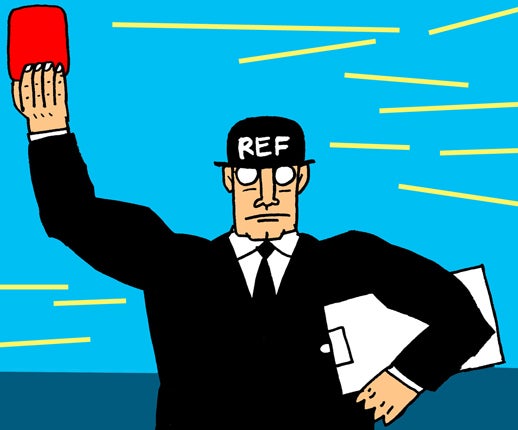
Your support helps us to tell the story
From reproductive rights to climate change to Big Tech, The Independent is on the ground when the story is developing. Whether it's investigating the financials of Elon Musk's pro-Trump PAC or producing our latest documentary, 'The A Word', which shines a light on the American women fighting for reproductive rights, we know how important it is to parse out the facts from the messaging.
At such a critical moment in US history, we need reporters on the ground. Your donation allows us to keep sending journalists to speak to both sides of the story.
The Independent is trusted by Americans across the entire political spectrum. And unlike many other quality news outlets, we choose not to lock Americans out of our reporting and analysis with paywalls. We believe quality journalism should be available to everyone, paid for by those who can afford it.
Your support makes all the difference.Something bad, sad and mad is happening in the UK. Bad for the quality of our democracy. Sad for freedom of thought. Mad for common sense. As is so common in life, it is driven by honest sentiments and by people who have stronger hearts than they have knowledgeable heads.
Our government and its lower layers is becoming obsessively prescriptive about how UK universities should behave. This is damaging. It will do the reverse of what is intended. The latest attempt is in the design of something called the REF. This will be unreliable and is suitably named – I write this article after the handball, missed by the referee, by Thierry Henry that put Ireland out of the World Cup.
The acronym stands for the Research Excellence Framework. I don't know about you, but when I read words like "excellence framework" my head and heart always take an unhappy turn. Such phrases make me think of the days of the Soviet Union (a country and system known, in the data used by researchers like me, for producing exceptionally poor mental health among its citizens, and a lot of tractors in the wrong place). I expect the later sentences in any such document to reveal mostly the reverse. On inspection, and I have just read it, the REF document that was recently released to universities, telling us how to score goals and avoid a red card, has that predictably Soviet-ish feel.
In my life I have met about 30 Nobel Prize winners. They spanned disciplines, but one thing I noticed about them was an extreme disregard for waffle. This is because you make waves in academic life by getting on with fine work not talking about the need for elite-sounding, technocratic, puffery titles for organisations.
The REF is to replace the RAE (the research assessment exercise). From assessment to excellence in one movement by the UK, you may think.
After 2012, according to the current proposal, this REF will be used to allocate research cash to universities. Its central innovation is that it wishes to reward impact outside academia, and the plan is to put 25 per cent weight (in other words to allocate a quarter of UK university research-funding) according to this impact.
This is illogical and dangerous. It will get universities to put a lot of effort into doing things that they are not meant to do.
Universities are not firms, or newspapers, or quangos. UK universities are good at what they do, especially given the level of resources available to them, and should be encouraged to stick disinterestedly to discovering what is true.
It sounds strange, but universities are not meant to influence the world – not, at least, in any remotely immediate sense. If you are sitting on the Islington Omnibus, you may think that an odd and incorrect line to argue, but it is important to be clear about why it is.
Human knowledge rests on the discovery of fundamentals – on what we might call basic truths. Your Omnibus is running, right now, because of scientific research done decades ago by people with no interest whatsoever in powering your bus. They cared about differential equations, about the crystalline structure of glass, about the coefficient of friction, about the science of braking distances, about the inside of hydrocarbons, about more things with long Latin names than you and I have had salad lunches.
Our problem here is ultimately with politicians. They feel obliged to be busy doing things in arenas where they have no expertise.
A little while ago, I was invited, with three others, to go and see one of the UK's best-known political figures. It is always interesting to meet a household name (I do not mean that is what he was thinking, I fear). This man, who certainly has a terrific brain, asked us in turn what he should do with the UK's universities. Every time I explained "leave them alone", he would listen courteously. Then he would think. Then he would turn to me. Then he would go back, each time, to a sentence that began something like, "But we put all this taxpayers' money into universities, and I just feel...".
Universities are not meant to be practical; other organisations are for that. If you think UK universities are meant to have "impact", you have not thought about the issues hard enough.
The writer is Professor of Economics at the University of Warwick
Join our commenting forum
Join thought-provoking conversations, follow other Independent readers and see their replies
Comments